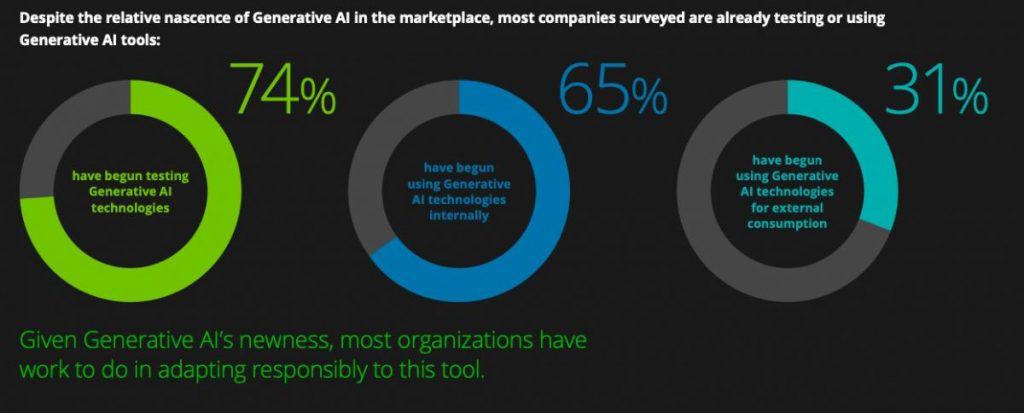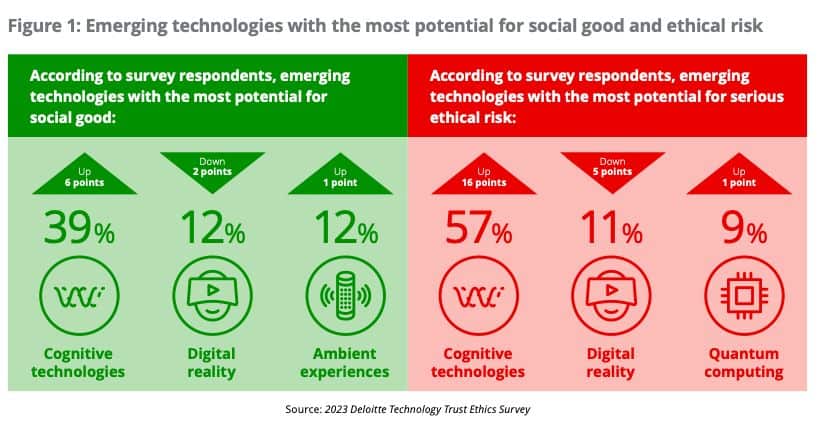Deloitte Survey Reveals Data Privacy as Primary Ethical Concern in Generative AI


In Brief
Deloitte’s State of Ethics and Trust in Technology survey highlights the ethical dilemmas surrounding generative AI adoption.
Business and technical experts reported a growing gap between the rapid integration of generative AI and the development of ethical guidelines

Deloitte’s latest survey, encompassing insights from over 1,700 business and technical professionals, underscores the ethical concerns of emerging technologies, with a particular focus on generative AI.
The “State of Ethics and Trust in Technology” report findings reveal a growing divide between the rapid adoption of generative AI and the lagging development of ethical principles guiding its use.
While 74% of respondents confirm their companies have begun testing generative AI, and 65% are already using it within their organizations —- a staggering 56% are uncertain or unaware of their company’s ethical standards concerning this technology.
Data privacy emerges as the top ethical concern, with 22% of respondents citing it as their primary worry. However, the importance placed on data privacy has dropped from 19% in the previous year’s survey to just 7% this year.

Despite the apprehension, 39% of respondents believe that cognitive technologies, including generative AI, hold the most potential for societal good among all emerging technologies. However, 57% perceive cognitive technologies as having the greatest potential for serious ethical risks, reflecting a substantial increase from 41% in 2022.
The study also reveals that organizations are adapting to automation by retaining and upskilling their employees, countering fears of job displacement. Interestingly, only 7% of respondents listed job displacement as a top ethical concern related to generative AI’s use.

Furthermore, the survey indicates a shift in expectations toward government involvement in setting ethical tech standards. While only 27% of respondents reported their companies collaborating with commercial entities (down from 31% last year), 71% believe that the government should play a more significant role in defining ethical standards, an increase from 61% in the previous year’s survey.
In light of these findings, Deloitte’s Technology Trust Ethics practice calls for increased collaboration among companies to identify risks and establish governance for emerging technologies. It emphasizes the potential benefits that can be reaped through collective efforts to ensure ethical AI adoption, ultimately contributing to a more equitable world.
Deloitte’s Technology Trust Ethics practice offers a framework to help organizations assess and implement ethical decision-making in emerging technology development, operation, and governance.
Ethical Challenges in Generative AI
In its nascent, largely unregulated state, generative AI raises significant ethical concerns. From copyright issues and disturbing “hallucinations” to biases in training data, cybersecurity threats, environmental consequences and limited transparency, the ethical landscape of generative AI is fraught with challenges.
Copyright infringements and data misuse have marred the technology’s development, with some AI companies utilizing creators’ work and personal data without consent. Moreover, generative AI occasionally starts to make stuff up and engages in undesirable behaviors like generating offensive content and spreading misinformation.
Bias in training data adds another layer of ethical complexity, perpetuating stereotypes and disrespect. In cybersecurity, generative AI’s human-like capabilities present vulnerabilities, as demonstrated in a recent incident where a tool deceived an unwitting worker.
Environmental concerns also loom large, with generative AI models consuming vast amounts of energy, posing a threat to sustainability. Lastly, limited transparency about data usage and training processes raises questions about data integrity and the accuracy of AI-generated outputs.
Disclaimer
In line with the Trust Project guidelines, please note that the information provided on this page is not intended to be and should not be interpreted as legal, tax, investment, financial, or any other form of advice. It is important to only invest what you can afford to lose and to seek independent financial advice if you have any doubts. For further information, we suggest referring to the terms and conditions as well as the help and support pages provided by the issuer or advertiser. MetaversePost is committed to accurate, unbiased reporting, but market conditions are subject to change without notice.
About The Author
Agne is a journalist who covers the latest trends and developments in the metaverse, AI, and Web3 industries for the Metaverse Post. Her passion for storytelling has led her to conduct numerous interviews with experts in these fields, always seeking to uncover exciting and engaging stories. Agne holds a Bachelor’s degree in literature and has an extensive background in writing about a wide range of topics including travel, art, and culture. She has also volunteered as an editor for the animal rights organization, where she helped raise awareness about animal welfare issues. Contact her on agnec@mpost.io.
More articles

Agne is a journalist who covers the latest trends and developments in the metaverse, AI, and Web3 industries for the Metaverse Post. Her passion for storytelling has led her to conduct numerous interviews with experts in these fields, always seeking to uncover exciting and engaging stories. Agne holds a Bachelor’s degree in literature and has an extensive background in writing about a wide range of topics including travel, art, and culture. She has also volunteered as an editor for the animal rights organization, where she helped raise awareness about animal welfare issues. Contact her on agnec@mpost.io.





















































